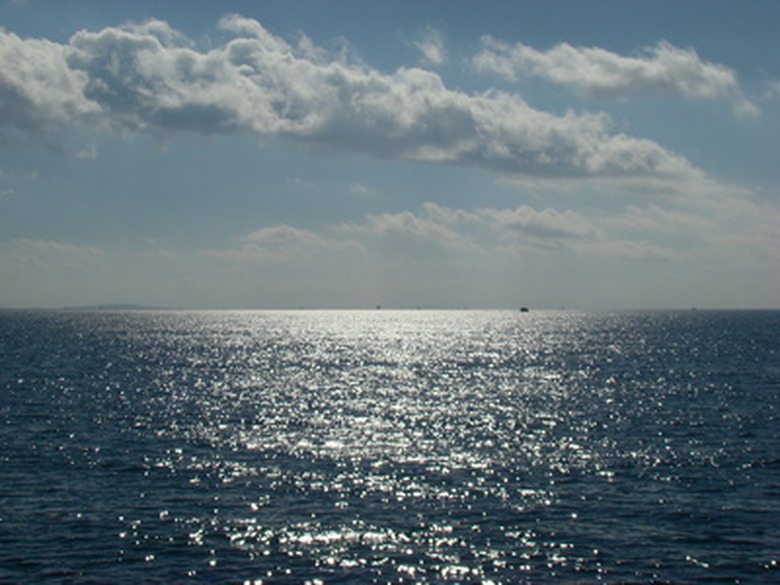How Do Ocean Currents Affect People?
The oceans of the world are dynamic, with the movement of huge volumes of water currents and gyres. These currents play a large role in life on Earth.
As such, the effects of ocean currents are felt directly by people.
Ocean Currents Definition
Ocean Currents Definition
The modern definition of ocean currents describes the movement of ocean water flowing continuously. Many such ocean currents are surface currents, made by surface winds. Other factors such as temperature and salinity affect water current as well.
The definition also portrays currents as a kind of conveyor belt moving warm water from the tropics to the cold poles, and then from the cold poles back to the tropics. This movement and change in temperature greatly affect the Earth's climate.
Effects of Ocean Currents
Effects of Ocean Currents
The effects of ocean currents on the globe are significant and far-reaching. Ocean currents regulate the Earth's climate and make up for the difference in solar energy radiation hitting the surface of the planet.
As such, water current distributes heat. The ocean absorbs most of the sun's radiation on Earth, in contrast to the atmosphere and to land. The climates of the Earth are regulated by this heat distribution and therefore are moderated.
Types of Ocean Currents
Types of Ocean Currents
Surface currents are wind-driven ocean currents that occur in the upper parts of the ocean. Surface currents affect the circulation of heat and fresh water. While wind moves surface currents, the Coriolis force affects the direction in which they travel.
The Gulf Stream is a famous type of western boundary current, a fast surface current that moves toward the North Pole along the eastern edge of North America. It then moves southward along the western edge of Europe. The Gulf Stream moderates the temperatures of Europe.
Eastern boundary currents are not as fast as western boundary currents. They tend to be shallower and wider, and they move cold water to tropical regions. One example of an Eastern boundary current is the California current.
Gyres are surface currents that center in ocean basins. These immense currents rotate in a clockwise fashion in the Northern Hemisphere, whereas in the Southern Hemisphere, they move counterclockwise.
What Human Activities Use Ocean Currents?
What Human Activities Use Ocean Currents?
Humans have relied upon ocean currents in vastly different ways over the course of history. Human survival owes much to ocean currents, without which the Earth might not be habitable. Ocean currents regulate climate and prevent it from becoming overly extreme.
People have used ocean currents to explore the Earth. Ocean currents affect the shipping industry, commercial and recreational fishing, and recreational navigation for boats. Having updated information on currents is directly related to how safely people can dock or navigate along coasts.
Ocean currents play a role in the distribution of pollution, such as oil spills. Oil and fuel tends to remain on the surface of the ocean, so knowing the current helps determine where such pollution might travel.
Safety operations such as rescues use currents to help look for missing people or other objects in the sea. Swimmers must educate themselves about ocean currents to avoid rip tides and other hazards.
Climate Change Effects on Ocean Currents
Climate Change Effects on Ocean Currents
Scientists study the ocean's currents not only to help people with business and recreational needs, but also to gauge how they might be affected by a changing climate. Given the role of ocean currents on climate, this has become a crucial form of study.
As polar ice melts, it cools down ocean water, which can affect ocean currents. **A colder Atlantic current, for example, would mean a colder Europe.** This could slow the current, leading to other effects such as a lack of the Indian monsoon, as well as poorer mixing of the ocean and sea life.
Another effect from climate change is an increase in wind effects as sea surface temperatures rise. This leads to wider currents because of greater wind energy. In turn, this creates more eddies in a current, which can affect human activity as well as the food chain of the sea.
As researchers learn more about the effects of climate change on ocean currents, satellite technology and other forms of monitoring will aid in helping people plan for long-term climate effects.
References
Cite This Article
MLA
Hermance, Dianne. "How Do Ocean Currents Affect People?" sciencing.com, https://www.sciencing.com/do-ocean-currents-affect-people-7277615/. 22 November 2019.
APA
Hermance, Dianne. (2019, November 22). How Do Ocean Currents Affect People?. sciencing.com. Retrieved from https://www.sciencing.com/do-ocean-currents-affect-people-7277615/
Chicago
Hermance, Dianne. How Do Ocean Currents Affect People? last modified March 24, 2022. https://www.sciencing.com/do-ocean-currents-affect-people-7277615/
